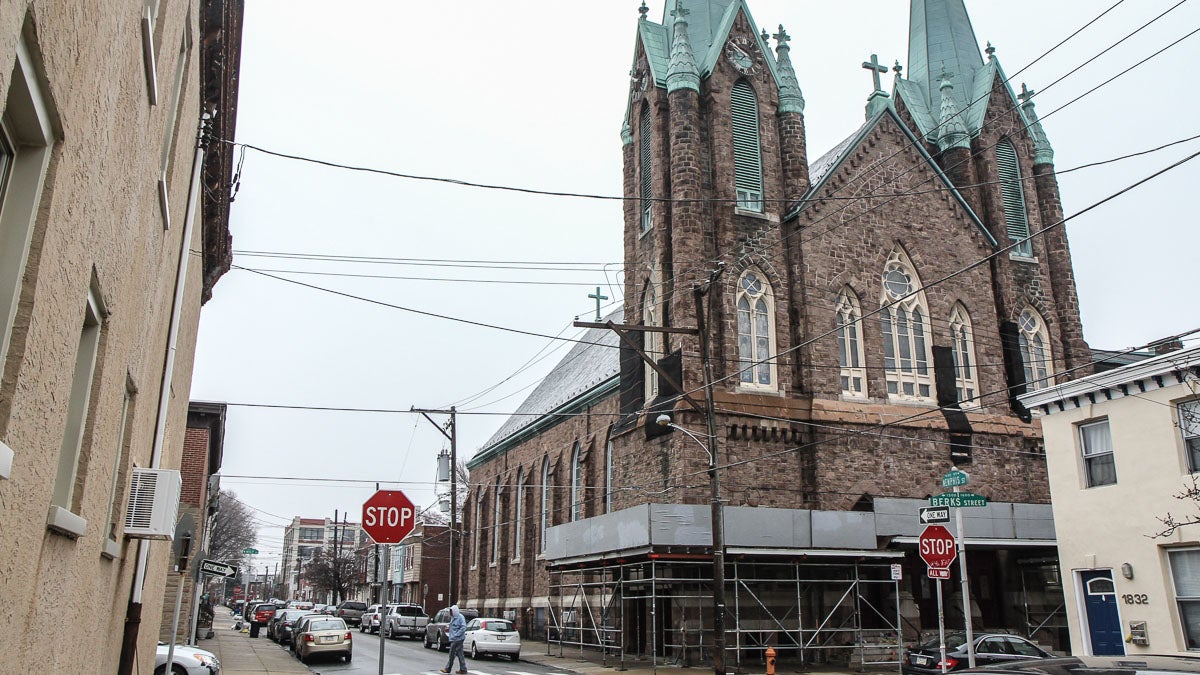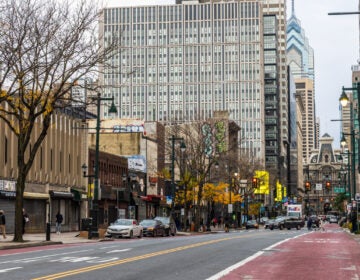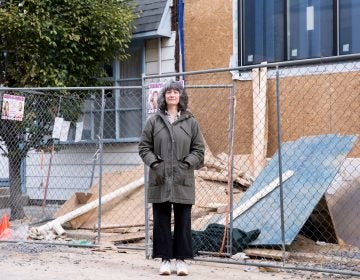Fishtown’s St. Laurentius church cleared for redevelopment
A judge’s ruling on Tuesday paves the way for a long-contested redevelopment of St. Laurentius, a crumbling Catholic church in Philadelphia’s growing Fishtown neighborhood.

The rezoning bill was introduced by City Council President Darrell Clarke in January after stones fell from the church’s facade and forced neighboring St. Laurentius School to close for three days. (Kimberly Paynter/WHYY)
This story originally appeared on PlanPhilly.
—
Updated 5:20 p.m
A Pennsylvania judge issued an opinion on Tuesday that could bring an end to an acrimonious two-and-a-half year struggle over the redevelopment of St. Laurentius, a crumbling Catholic church in Philadelphia’s growing Fishtown neighborhood. The ruling in favor of local developer Leo Voloshin and Linden Lane Capital Partners paves the way for the historic structure’s conversion into 23 apartments.
The Commonwealth Court opinion from judges Michael Wojcik, Ellen Ceisler and Bonnie Leadbetter comes less than a month after stones fell off the 1600 Berks St. church’s facade, forcing neighboring St. Laurentius School to close for three days. Council President Darrell Clarke responded to the incident by introducing council legislation aimed at speeding renovation of the building.
The latest decision quashed an appeal brought by a group of former parishioners, the Faithful Laurentians, over earlier decisions by the city’s Zoning Board of Adjustment and the Court of Common Pleas that similarly favored the planned apartment conversion.
Initially, the Archdiocese of Philadelphia had deconsecrated the church in 2014 and sought its demolition after structural problems were detected by city building inspectors. But an unrelated neighborhood group, known as the Friends of St. Laurentius, successfully won historic certification for the 131-year-old building, leading the Archdiocese to sell the property to Linden Lane Capital with the understanding that developers would seek an adaptive reuse of the structure.
Ultimately, a 2016 plan to reuse the structure as apartments won approvals from the city’s Historic Commission and the ZBA. But the Faithful Laurentians objected to these plans, arguing that the Archdiocese of Philadelphia did not have authority to sell the property because the building “belongs to [its] parishioners.”
The group, which expressed interest in restoring the church to ecclesiastical use, appealed the ZBA decision in the Court of Common Pleas, but was rejected due to the group’s lack of standing. Lawyers for the city argued that the group’s members did not identify themselves as an aggrieved party or an official organization at an earlier ZBA hearing and therefore could not sue over that decision.
Others, like Inquirer architectural critic Inga Saffron, meanwhile described the Faithful Laurentian’s efforts as a “nuisance” lawsuit with little religious purpose. Saffron noted that the group had shifted its demands, in early 2018, to simply reducing the number of planned apartments in an effort to minimize the impact on neighborhood parking.
Undeterred, the former parishioners sought further relief in Commonwealth Court. But this week’s decision tossed out the second appeal, again due to lack of standing. The judges’ opinion describes the Faithful Laurentians as “an informal group of citizens” that had failed to establish themselves as “an aggrieved party with representational standing in this matter.”
A lawyer for the Faithful Laurentians disputed the Commonwealth Court decision, but did not say if the former parishioners would continue their appeal efforts. Voloshin said he is pleased by the decision but concerned that opponents to project could file another appeal.
“Unfortunately, the ruling is not necessarily going to guarantee that we’re able to move forward with the project,” Voloshin said. The developer hopes Clarke’s legislation, which would rezone the site, would preempt future appeals. “We’ve been in touch with City Council to have them move forward with the remapping to have them continue to move forward with the remapping of the property. Which would pretty much make this whole court case moot, by making it a by-right project.”
Voloshin said he hopes to start work on the church this summer. He said that he planned to proceed with the proposed apartment conversion, once a structural engineer had determined whether or not deferred maintenance had further compromised the building.
This is a developing story and will be updated as more information becomes available.
WHYY is your source for fact-based, in-depth journalism and information. As a nonprofit organization, we rely on financial support from readers like you. Please give today.




